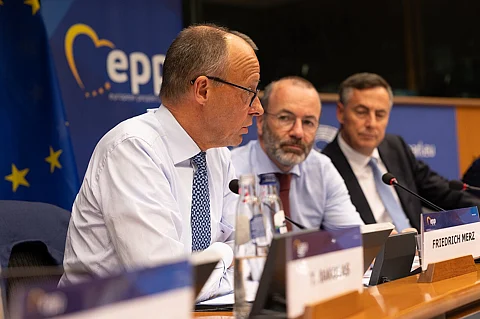

After days of intense negotiations, Germany’s ruling coalition has reached a landmark agreement to significantly increase state borrowing, paving the way for a historic debt reform package. The deal, brokered between the conservative CDU/CSU bloc led by Friedrich Merz, the Social Democrats (SPD), and the Greens, is set to be voted on in parliament next week. The agreement includes a massive boost in defense spending and the creation of a €500 billion ($545 billion) special fund for infrastructure projects over the next decade.
Under the proposed plan, defense spending exceeding 1% of Germany’s gross domestic product (GDP) would be exempt from the country’s constitutionally mandated "debt brake." This reform marks a significant shift in fiscal policy, allowing the government to finance critical investments outside the constraints of the ordinary budget.
Greens Secure Key Concessions
The Greens, who had initially threatened to block the deal, secured key concessions to ensure the additional funds would be directed toward infrastructure and climate initiatives rather than being diverted to fulfill campaign promises by the CDU/CSU and SPD. As part of the compromise, €100 billion will be allocated to a climate and economic transformation fund, a move seen as a bargaining chip to secure the Greens’ support.
Friedrich Merz, leader of the CDU, confirmed that the bill would include the term "additional" to address Green demands, ensuring that ongoing government projects cannot be financed from the extra funds unless they exceed 10% of the allocated budget. Merz also announced that Germany plans to release €3 billion ($3.27 billion) in military aid to Ukraine once the debt reform is approved by the upper house of parliament, the Bundesrat.
"There will be no shortage of financial resources to defend freedom and peace on our continent," Merz emphasized. "Germany is making its major contribution to the defense of freedom and peace in Europe."
A Boost for Germany’s Economy
The agreement has been hailed as a significant step toward revitalizing Europe’s largest economy. SPD co-leader Lars Klingbeil described the debt package as a "powerful boost" for Germany, stating, "We have laid the foundation for Germany to get back on its feet and protect itself."
The deal also expands the definition of "defense" to include intelligence services, civil defense, and aid to countries attacked in violation of international law. This broader interpretation reflects the coalition’s commitment to addressing both traditional and non-traditional security challenges.
Next Steps: Parliamentary Approval
While the agreement represents a major breakthrough, it still requires approval from the Bundestag, Germany’s lower house of parliament, and a two-thirds majority in the Bundesrat. If passed, the reform will enable a significant increase in defense spending and infrastructure investment, marking a pivotal moment in Germany’s fiscal and security policy.
Merz described the agreement as an "acceptable, good result," signaling optimism about its passage. The deal underscores Germany’s commitment to strengthening its defense capabilities and supporting Ukraine, while also addressing long-term infrastructure and climate goals.